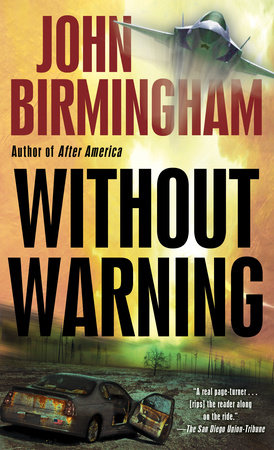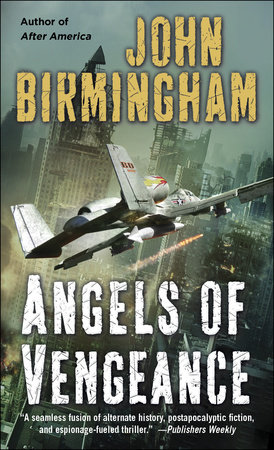Excerpt
Without Warning
Chapter One
FROM NOWHERE
Louis Rossetto had a strange effect on people. He was like a magnet whose grip increased dramatically at close range. Listeners might be dismissive at a distance, and dubious as he opened his mouth, but then he pulled them in and held them close. He always seemed to be better informed than anybody else in the room. He had sources from Afghanistan and contacts in Sri Lanka. He knew Dutch, Italian, and Portuguese. Because he was so coherent, and because when he had made his point he fell silent and waited calmly for a response, Louis had a peculiar way of compelling his acquaintances to express agreement with things that they were not really sure of. This could be embarrassing later and sometimes even made people swing the other way and say they hated him.
John Plunkett was unnerved the first time he got a glimpse of Louis through the window of an elegant office building on the Quai d’Anjou, in Paris. John was a big man with a deceptively placid expression. Normally he worked as a graphic designer in New York City making annual reports for big corporations. “Selling shit on a stick,” he called it. But at the moment John was short on money and looking for a job. He had seen an ad for a designer in the International Herald Tribune, and after scheduling an interview he decided to walk by the office and have a look. Truck traffic paused in front of the building, obscuring his view, so he crossed the street and peered between the drapes. He saw a tiny computer sitting on a desk, with an orange screen and black letters too small for him to make out. In front of the screen a tall man sat completely still, his face expressionless. He looked like some kind of hippie or derelict, out of place behind these old stone walls and six-paned windows. The man suddenly turned toward the street and stared. Something about his unblinking expression, its lack of acknowledgment or human recognition, startled the designer, and he fled. Later John would interpret this encounter as a premonition, but light fades early in Paris in the fall and perhaps Louis Rossetto’s gaze registered nothing because he only saw his own face in the window, reflecting back.
Designers are never implicated, John told himself, after he took the job with Real Invest. Real Invest was a discreet financial operation that offered individual banking services and untraceable European investments for Americans who preferred to keep their capital gains out of the hands of the Internal Revenue Service. Bill Sigal, the owner, would eventually flee Paris one step ahead of the police. John found Sigal to be a slightly threatening person, self- assured and ruthless in his extraction of cash investments from midwestern rubes (whom he called, as a sort of shorthand, “dentists”), but Plunkett’s job was only to redesign the company’s newsletter, called Globescan, and he took no more responsibility for the malodorous quality of the Sigal enterprise than he did for the assertions made to stockholders of his corporate clients.
Later John would describe Real Invest as a “lure for expatriate bums looking for an angle.” On the other hand, were they really bums? The man who had startled him at the window may have been a drifter and an odd duck, a character from another time and a kind of political exile, but he was only a bum if the word conjured meanings beyond mere vagrancy: boisterous anarchism, say, and hatred of authority, and a love of mayhem as a source of both entertainment and sustenance. Add these antiquated associations into the mix, and you still wouldn’t have it right, because the old type of bum—the Wobbly, the hobo, the one-big-union man—was an enemy of capitalism, while Louis Rossetto had a master’s degree in business administration from Columbia University, where he specialized in marketing and finance. He was an amateur scholar of the Haymarket riots and a deep reader of libertarian economics. Many years after their first meeting, when their partnership had brought John both international acclaim and a deep sense of personal grievance, he would remember his conversations with Louis as the most interesting he had ever had in his life.
Louis was the editor of Globescan, which he typeset himself using the primitive tools of the new microcomputer industry. In this he was heir to a tradition of profound innovation. His own father had been an employee of the Mergenthaler Linotype Company, whose founder, Ottmar Mergenthaler, invented the world’s first commercially successful automatic typesetting machine. The Linotype revolutionized the newspaper business. In the fifties Louis’s father had helped develop one of the first electronic phototypesetting machines, the Linotron, and by the time Louis was a teenager, typesetting had migrated from the noisy floor of publishing plants to production departments or even directly into the editorial offices of small publications.
Louis was well placed to make something of this legacy. By nature inquisitive and stubborn, he had an outsider’s toughness that made him difficult to intimidate. In Great Neck, the Long Island suburb where he grew up, his neighbors had been affluent, Jewish, and politically liberal; Louis was Italian and his family was conservative. Arriving at Columbia in 1967, when the Students for a Democratic Society were attempting to close down the university, he declared himself for Nixon. That year campus revolutionaries battled the police, who beat them along with bystanders. Louis Rossetto watched the Columbia crisis unfold and devoted himself to political study, moving steadily out through the ramifying veins of conservatism until he got to the finest capillaries where the isolatos of the right—the libertarians—mingled with the isolatos of the left—the anarchists. For a short time he was the unlikely president of the Columbia Young Republicans, but he was a shaggy-haired, antiwar troublemaker, out of sync with the party’s mainstream. Eventually, he went to work as a volunteer staff member at an anarchist journal, The Abolitionist. The thing to be abolished was government. Louis stood at the waist-high table, running warm paste over the backs of the galleys. He knew that advances in typesetting meant more than added convenience for typesetters. For him, cheap printing was a tool of revolt, though not the sort of revolt his peers may have had in mind. The New York Times Magazine put Louis on the cover as a representative of a new type of radical. Inside, Louis repeated the libertarian slogan: “Ask not what your country can do for you, ask what your country is doing to you.”
Disillusion on the left has long been a cliché, but as the decade turned, Louis was influenced by a less publicized trend: disillusion on the right. The right, after all, was the side that really seemed to be losing the revolution. As corporations made peace with the counterculture, and the last of the anti–New Deal, Roosevelt- hating, small-town businessmen entered their dotage, you had to wonder what was going to happen to the untimely personalities who wanted to carry on in the older Republican image: the rugged, storybook individualists; the enterprising moguls-to-be whose rights of accumulation were abrogated by the income tax; the bright young men and women of ’68—of Nixon for President in ’68—whose field of activity was swamped by inflation, stagnation, and Republican price controls. Nobody knew yet what a comeback the entrepreneurial ideal would make. President Reagan was still ten years away.
Louis’s opinion that the government should be abolished did not prevail. As soon as he graduated, he started business school at Columbia, but by the time he emerged he was certain he did not want to work for a boring American corporation. Then came Watergate. This was an exciting development. Social conflict always opens avenues for unusual talents. As the televised hearings unfolded, Louis saw a chance to escape from what he thought of as the corporate draft. His subject was in front of him and in two months he had written a novel. It was a potboiler called Takeover. The premise was a coup by Richard Nixon. It had one sex scene, one chase scene, and extensive political exposition.
In December 1973 the young novelist was out at his parents’ house on Long Island, waiting for a call from his agent. So far there had been no buyers. The temperature was 31 degrees, and it was raining. By midnight, all the trees and branches were covered with an inch of ice, and he lay in his bed listening to the weaker limbs break off. It seemed that he would not escape the corporate draft after all. The next morning, with everything in sight frozen and dead branches a foot deep on the ground, he got his call and found out that a small publisher named Lyle Stuart had agreed to bring out the book. The money was negligible, and Nixon resigned before it came out, ruining the joke, but this was beside the point. Louis would get, after all, his spy’s disguise, his public costume, his word to put on the blank line of the entrance documents when he came and left the country. He was a writer.
For ten years he survived on odds and ends: a few magazine stories, some carpentry. He never wrote another novel, but he always made just enough money and he had extraordinary luck at showing up in zones of conflict that were just breaking down into chaos, circumstances in which a person of courage never has trouble getting a square meal. In the mid-seventies he found himself in Rome, where he befriended Piernico Solinas and ghost-wrote the young assistant director’s book about the making of Caligula, a “sex colossal” written by Gore Vidal, funded by Bob Guccione, and directed by Tinto Brass. Caligula was filmed during the peak of the sexual revolution, when it seemed more or less reasonable for a well-known director to demonstrate the exact manner in which he wanted cunnilingus performed on an actress. The moral of Salinas’s account, Ultimate Porno, is that authority is an illusion, and that established hierarchies are easily hijacked by individuals of conviction and stamina. This was a valuable lesson.






